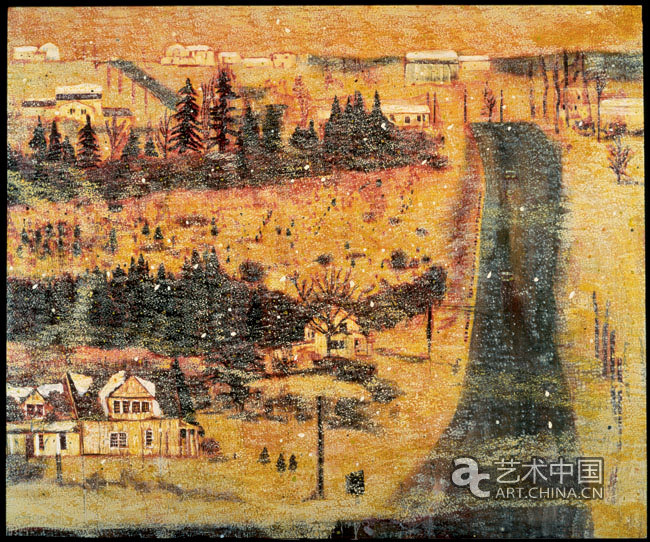彼得多伊格-《山屋》 |
| 藝術中國 | 時間: 2010-01-29 18:40:08 | 文章來源: 藝術中國 |
|
彼得多伊格-《山屋》 Peter Doig Hill Houses 1990-1991 Oil on canvas 200.1 x 240.3 cm 彼得.多伊格 山屋, 1990-1991 布面油畫 200.1 x 240.3 cm
1990年,彼得•多伊格剛剛從切爾西藝術學院(Chelsea School of Art)修完碩士課程,並作為一名白教堂藝術家獎(Whitechapel Artists Award)得主開始聲名鵲起。他的畫作摒棄主流而另辟蹊徑:“20世紀80年代晚期和20世紀90年代早期大多數作品看起來都給人純凈、當代、靈巧之感……我有意創作出看起來質樸而有手工感的作品。” 《山屋》展示了多伊格與眾不同之處,這一海市蜃樓般的冷峻意象傳遞出既有敘述又有回憶的意蘊,引領思緒超越無框的畫布,給人以莫奈的“水仙”般的歷史感。 這幅畫作分散的焦點和跳躍的視角導致了理查德•希夫(Richard Shiff)所謂的“漫遊的激動”。景象通過朦朧質感令人驚訝,就像迎著一輛朝著天際飛馳的車輛撲面而來映入風擋的景象。巨大豎條狀的道路本來應該將我們引入畫面,卻反而衝到了原本平坦的顯像面的最前面。模糊的電線桿無法在踩著狐步飄然而過時量出畫面。只是在畫面上部的三分之一處才出現了小孔窗、道路的甩尾處—距離感的提示。這裡是崇高與庸俗的匯聚處,在這裡情感的標識物——杏仁糖般的房屋和童話般的松樹——與荒野的恐怖形成了鮮明的對比。 多伊格的經歷是一種回歸。他于1959年生於愛丁堡,他的家庭在定居加拿大之前在特立尼達生活了幾年;多伊格隨後搬回英國,到聖馬丁藝術學校(St Martin’s School of Art)學習,其後又回到加拿大(他曾在蒙特利爾做過電影布景畫師);後來他又回到倫敦攻讀碩士學位,而現在生活在特立尼達島。朱迪思•奈斯比特(Judith Nesbitt)評價説:“令人驚奇的是,他對主題的追求是與他階段性地地理位置變化聯繫在一起的,而只有當他離開一定距離之後,其直接地理環境的視覺刺激才會釋放出來。”然而正如所説的大型畫布激發了他青年時期的巨幅加拿大風光作品一樣,多伊格摒棄了顯而易見的題材。在回憶自己的早期作品時,他堅稱:“它們不是關於加拿大的畫作(儘管有些確實是),而是蘊含某種也許有些大眾化概念的作品——將某種‘簡樸’引入藝術之中。”這一簡樸概唸有助於在《山屋》這幅作品,這樣一個古老的茶盤一樣泛著黃色的作品與那種“純凈、當代、和靈巧之感”之間製造出數以百英里計的距離。有關開闊道路的幻想、出於驚恐的戰栗與渴望:我們不知不覺進入這樣的意象之中,這正是垃圾搖滾的紀念品(多伊格收藏的磁帶中就有涅磐樂隊1991年發行的受到狂熱崇拜的專輯“沒關係”(Nevermind))。 有人認為這幅作品源於刊登在《國家地理》雜誌上的一幅照片,那幅照片據認為多少喚起了作者對童年時代魁北克某地的回憶。但即使如此,《山屋》和所有其他作品一樣依然是關於繪畫的作品。值得注意的是,多伊格在其光學效果以及聖誕卡涵義方面放大了雪花的表面性:“雪花還是同樣的大小,她是不可透視的,我所喜歡的是有關雪的‘觀念’的這一概念。她變得像一層紗幕,使你透過紗幕看出去。”對於事物的“觀念”的偏好以及對透過柔和而無序的顏料層次凝視的強調使畫面容易受到推論的影響,這一點與多伊格的工作方式相一致。他喜歡將未完成的畫作擱置一段時間進行構思。他曾經描述過這麼做的必要性:一開始就在畫室的桌上和地上到處放好打開了的顏料罐,隨後把一幅畫單獨放置很長時間,反覆斟酌,等以後再回來接著畫。 Peter Doig In 1990, Peter Doig had just finished an MA at Chelsea School of Art and as a winner of the Whitechapel Artists Award was on the cusp of recognition. He was producing paintings that beat a path away from the mainstream: ‘In the late 1980s and early 1990s most art had a clean, contemporary, slick look … I purposely made works that were handmade and homely looking.’ Distinctive Doig territory is staked out in Hill Houses, a frosty mirage that whiffs of narrative and memory, beckoning beyond the unframed canvas to something as un-contemporary as Monet’s ‘Water Lilies’. This is a picture whose scattered focus and jumps in perspective result in what Richard Shiff identifies as a ‘sensation of roaming’. Through the mistiness, the view takes us by surprise, as if swooping into the windscreen of a car as it races over the skyline. The road, a big vertical stripe, ought to guide us into the scene, but instead forefronts the flatness of the picture plane. Telegraph poles are blurry, not so much pacing out the landscape as shimmying across it. Only in the top third is distance suggested – pinprick windows, a tail-flick of road. It is a meeting ground for the sublime and the kitsch, where sentimental markers, those marzipan houses and fairytale pines, effectively strike a match against the terror of the wilderness. Doig’s story is one of returns. Born in Edinburgh in 1959, his family spent a couple of years in Trinidad before settling in Canada; Doig moved back to Britain, to study at St Martin’s School of Art, thereafter returning to Canada (he had a stint as scene painter for film sets in Montreal); it was back to London for his MA, and he now lives in Trinidad. Judith Nesbitt remarks, ‘His search for his subject has been curiously linked to his periodic geographical displacement, whereby the visual stimulus of his immediate geographic environment becomes released only with distance.’ Yet as much as the large-scale canvases are said to evoke the vast Canadian landscape of his youth, Doig screens off obvious subject matter. Reflecting on early works, he insists, ‘They weren’t paintings of Canada (though some were) but paintings of an idea of something that was maybe folk – bringing a sort of “homeliness” into art.’ This idea of homeliness serves to put hundreds of miles between Hill Houses, yellow-stained like an ancient tea tray, and that ‘clean, contemporary, slick look’. Fantasies of the open road, shivers of fear and longing: this is an image that creeps up on us, a souvenir of grunge (Nirvana’s cult album Nevermind, 1991, is counted among Doig’s collection of cassettes). A photograph from National Geographic, loosely evoking a childhood spot in Quebec, has been isolated as a source, but even so, Hill Houses is a painting about painting as much as anything else. Notably, Doig amplifies the superficiality of snow in terms of its optical effect as well as its Christmas card connotations: ‘The snow is all the same size, it’s not perspectival, it’s this notion of the “idea” of snow which I like. It becomes like a screen, making you look through it.’ This predilection for the ‘idea’ of things, and the emphasis on looking through the soft, untidy layers of paint, render the picture open to inference, correspondent to Doig’s working method. He prefers to keep paintings unfinished for a period of gestation. He has described the need, on starting out, to open pots of paint all over the studio table and floor, and later to leave a painting alone for long stretches, being thought about, waiting to be returned to. D.F. |
| 注:凡註明 “藝術中國” 字樣的視頻、圖片或文字內容均屬於本網站專稿,如需轉載圖片請保留 “藝術中國” 浮水印,轉載文字內容請註明來源藝術中國,否則本網站將依據《資訊網路傳播權保護條例》維護網路智慧財産權。 |
